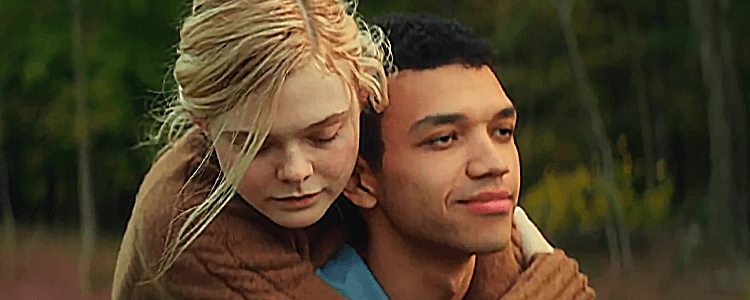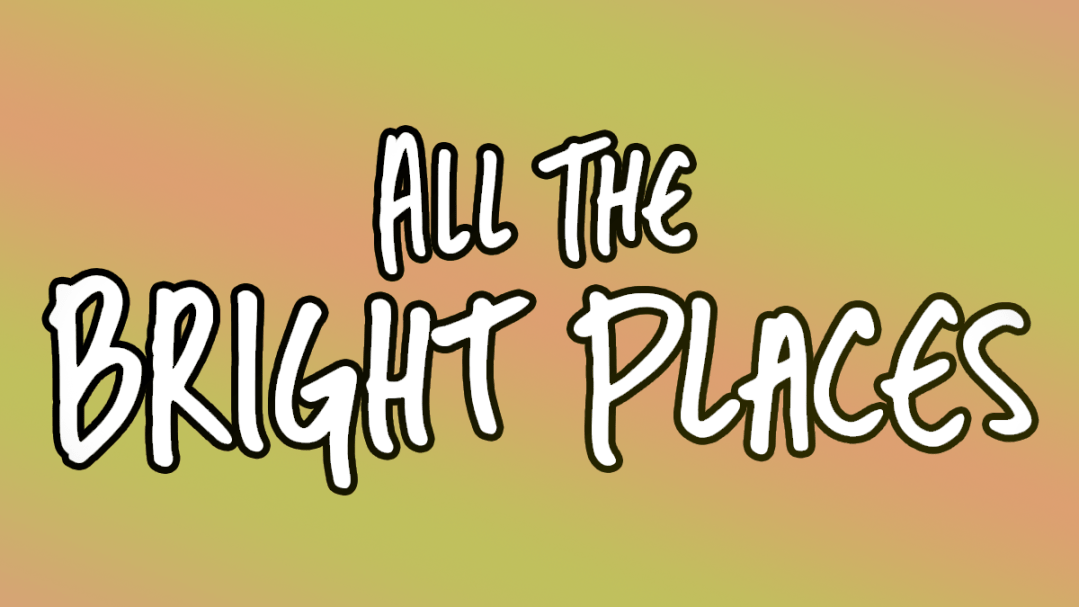Released: 28th February
Seen: 29th February

Sometimes when I pick a movie to review (because until I can turn this into an actual job, I still get to pick which ones I see and when) it’s often based on just how much effort I feel like putting into them. If I feel like I have the time and mental capacity to fully understand and articulate the various issues in a two-and-a-half-hour-long exploration of a political structure, I’ll go find one and if I feel like I need to let out some well-earned snark, I’ll find a 90 minute animated film that gives off the impression that it’s going to be bad and go to town. Sometimes though I have the time available but don’t want to really have to think about something too heavy so thank god Netflix is there with a teen romance film where I literally need to put in zero effort because who the hell even needs to think about one of these things? So that’s what led me to pick the teen romance drama All The Bright Places, thinking “Oh, this is going to be easy. I won’t need to think or handle anything heavy, it’s a cheesy looking teenage romance” and then I clicked it and… they tried to touch on heavy subjects, why does this happen to me?
All The Bright Places, an adaptation of the 2015 novel of the same name by Jennifer Niven, is your typical teen love story featuring a smart female protagonist, in this iteration known as Violet (Elle Fanning), who happens upon the troubled male ne’er-do-well, here referred to as Theodore (Justice Smith), and gets to know him. As is protocol in these movies they both have a series of assorted demons in their lives that are mostly resolved through the power of love which consists of various vignettes of meet-cutes happening in assorted locations that lead to discussions of shared psychological trauma or how no one else understands them. One of them has a bunch of friends who warns them to stay away from the other partner, the other partner is labelled a freak and gets in trouble at school. The parents don’t seem to understand them, there’s a third act moment where they get caught up on a long date and lose their virginities together, oh my god this film follows every single cliché one associates with this genre except this time the big thing that brings these characters together is Violet’s suicide attempt and the thing that keeps popping up is a combination of survivors guilt and mental illness from both parties.
In theory, a love story between two people with serious mental illnesses would actually be interesting. Not enough films seriously tackle mental illness and having it as an element of a love story is a good idea, in theory. In practice it turns the mental illnesses into character quirks, it’s just a weird quirk that Theodore regularly goes into depression spirals that mean he doesn’t answer his phone. The scene where Violet is clearly intending to jump from a bridge to her death is played as just a small thing, everyone underplays it and it’s how the film opens as a way for the characters to meet and little else. There’s never any attempt to actually deal with the idea that Violet has intense survivors guilt due to the death of her sister, it’s played off almost like a joke that she won’t get into a car (her sister died in a car accident) and when she finally does there are no real issues. She doesn’t admonish him for driving fast, barely seems nervous when his eyes aren’t on the road, she’s totally fine because of the power of love! It’s not handling mental illness or trauma well, it’s throwing them into the same average romance we’ve seen a few thousand times like it was seasoning.

The characters aren’t really that interesting, they have no dimension to them other than quirks thrown upon them to create the illusion of being interesting. They’re the kind of characters who have entire conversations that consist of Virginia Woolf quotes… like teenagers are often known to do. There’s a wall of post-it notes in Theodore’s room which is meant to imply he has a lot of deep thoughts but god help me if I could tell you any of them. The recurring nickname Theodore gets is ‘Freak’ but he never does anything that would warrant such a nickname. He isn’t quiet or shy, he doesn’t have weird interests, he doesn’t burn things, there’s nothing here other than a typical seeming teenager who we are told is a freak but never shown why he might earn that title. Violet is even less interesting as a character, her entire character basically revolves around that survivor’s guilt but it never manifests as anything other than cold indifference to everyone else and the opening scene suicide attempt which is pretty poorly handled and never really referenced again until near the end when she basically tells her dad “Oh, BTW, I almost jumped off a bridge… no biggie”. It’s never treated like the big deal it should be, we move on from it so quickly that it barely registers as significant.
What gives this film something half decent is the two leads who have enough chemistry that this should actually work. Justice Smith shows off that he can do a serious role just as impressively as he handled the comedy in Detective Pikachu and Elle Fanning is just effortlessly embodying this character in ways that genuinely impressed me. Together they actually work, scenes they share have a sweet innocence to them that makes you believe they like each other. It’s hard to get a couple of teenagers to have real chemistry but this works so well. I would gleefully watch these two leading another teenage romance film at some point in the future, but I hope when they do another film together that it’s better written than this one.
I believe my thoughts on this film are best said by the film itself, specifically by Theodore during one of his many meetings with the school principal. “Just your average teenage melodrama”. That’s all this is, an average teenage melodrama that touches on serious topics without doing anything interesting with them. It’s not like it’s actively harmful (except maybe the opening scene, but it’s over so quickly it barely has a chance to linger) but it’s also not actively interesting. It’s fine, it’s a film that’s there that I didn’t hate but didn’t think very much of at all. It’s the same as all the other average teenage melodramas out there but with delusions of grandeur brought on by the heavier subject matter and the repeated use of the word ‘fuck’. I can’t even hate it, I’m probably going to forget it by the time I actually post this thing, it’s just not that deep.

